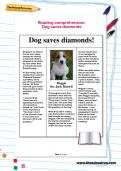What Types of Words Are Easier for With a Limited Vocabulary to Babies to Learn
How to build your child'due south vocabulary

Assistance your child become a master of words with these keen tips for boosting vocabulary at home.
Recently, a survey of teachers from 800 secondary schools revealed that many children are leaving principal school with a vocabulary that's inadequate for their age.
Four out of 10 pupils have such a limited vocabulary that it'due south affecting their learning, according to the study.
Vocabulary matters for many reasons. Children in Year 6 need to understand a wide range of words to succeed in their SATs; currently, almost 30% neglect to accomplish the expected standard in reading.
'The topics of the reading paper could exist anything, so it's really important to have a wide vocabulary covering a range of contexts,' says instructor Jack Phillips, who blogs at verbivoreteacher.com.
A wide vocabulary is also essential for the eleven+ grammer schoolhouse entrance test.
And it's not just in the classroom that vocabulary matters.
'Words empower children to make sense of the world around them,' Jack explains. 'A wide vocabulary helps them to put their emotions into words, socialise with people, imagine and wonder.'
And so how tin can nosotros equip our children with a vocabulary that will help them succeed?
1. Brand conversation a priority
Immature children are like sponges, so it'south important to immerse them in language right from the starting time.
'The number of words children acquire in the early years is closely related to their future success,' says Alice Penfold, Project Manager of the Words for Piece of work plan at the National Literacy Trust.
'The quality of parent-child interactions is one of the biggest factors influencing vocabulary, and then it's vital to talk to your kid and expose them to different words.
'Try naming objects, using number words, and introducing words that explain emotions: the more words they understand, the more they volition be able to utilise.'


Download vivid reading comprehension resources
- The Stolen Book of Spells workbook
- PLUS 100s of fantastic reading comprehension worksheets
2. Read together
'The key to a wide vocabulary is a beloved of reading,' Alice says. 'Information technology's important to brand reading a routine, with a regular slot everyday.
'Don't simply read school books: recognise your child's interests and find books that relate to them, as this will encourage them to read purely for enjoyment.'
Keep reading aloud to your child, even in one case they're able to read independently: kids love to hear stories, and you tin can build their vocabulary past choosing books that would exist also hard for them to read themselves.
Don't just stick to stories: reading non-fiction books, children's newspapers and comics will expose your kid to a wider range of words.
'Talk about what you're reading, too, equally this will help your child's comprehension,' Alice adds.
3. Employ labels
'Use Postal service-It notes to characterization objects around the firm, every bit this will help your kid learn to read new words,' Jack suggests.
'Every bit they get older, you can add adjectives to the labels, such as "wooden table," to augment their vocabulary further.'
four. Play word games
From I Spy to Scrabble and Bananagrams, there's a huge range of word games that will help your kid learn new words.
'Making language-learning a part of games is actually useful, as it makes it interactive and fun,' Alice says.
5. Use words in sentences
At that place'southward no point in your child learning new words if they don't know how to utilise them. Getting them to use a discussion in a spoken or written sentence will help them understand its pregnant and context.
If your child gets weekly spellings from schoolhouse, become them to write a sentence that includes each discussion, encouraging them to look it up in a dictionary if they're unsure of its significant.
half dozen. Write for pleasure
Children are sometimes turned off writing by being made to write nearly things that don't involvement them at school.
Try to counter this by encouraging your child to write for pleasure on any discipline that enthuses them. 'Don't correct their writing – just let them write for the sake of it,' Alice says. 'It's been proven that children who enjoy writing are vii times more than probable to write at the expected level for their age.'
vii. Create a discussion wall
This is a neat way to help new words sink into your child's brain. 'Write each new word they learn on a strip of newspaper, and stick them on the wall in their bedroom,' suggests Jack.
'If y'all don't want to plaster them all over the wall, you tin can stick them in a give-and-take scrapbook instead.'
8. Introduce a word of the day
Introducing a new give-and-take each day will boost your kid's vocabulary by 365 (or 366!) words every year, and is an activity that the whole family tin get involved with.
You could employ a word-a-mean solar day calendar or a website or app to propose new words, or pick them out of a dictionary.
Make certain your child knows the meaning of the give-and-take, equally they'll so be able to use it in their own speaking and writing.
9. Play together
'Playing with your child is crucial for developing communication skills,' Alice explains. 'Children larn to make new sounds, talk in full sentences, ask questions and empathise how interactions piece of work.
'It likewise helps them communicate with other children.'
10. Don't 'impaired downward'
Children always have a bigger receptive vocabulary than expressive vocabulary: that is, they understand more words than they're able to utilize. This means that at that place's no need to oversimplify the way in which yous talk to your child.
'Don't water downward your linguistic communication, every bit we're hoping children will option upwardly on the words we're using,' says Jack. 'Children need to be exposed to a word nigh 12 times to fully accept information technology in.'
11. Show them how to apply a thesaurus
Knowing how to utilize a thesaurus volition increment your child's vocabulary and improve the quality of their written work, so show them how to use information technology and encourage them to have it on hand when they're writing.
You could read through their writing with them, and get them to highlight words that they've overused and then they tin can wait up alternatives.
12. Introduce word banks
Word banks are collections of related words: for example, adjectives, alternatives to 'said,' or nature words.
You'll find lots of word banks online, or you lot and your child could make your ain using a notebook with a folio per word group, adding new words as you find them.
Your child tin can have word banks on mitt when they're writing to help them observe new and more interesting words.
thirteen. Make a big deal of language
'Positive reinforcement is known to help children learn, then create an surroundings where vocabulary is praised and historic,' Jack says.
'Make a fuss of new words your child uses in speaking and writing: the more than enjoyable the feel of learning vocabulary, the more children volition be geared to choice it up.'
swisherdrigatured.blogspot.com
Source: https://www.theschoolrun.com/how-build-your-childs-vocabulary
0 Response to "What Types of Words Are Easier for With a Limited Vocabulary to Babies to Learn"
Post a Comment